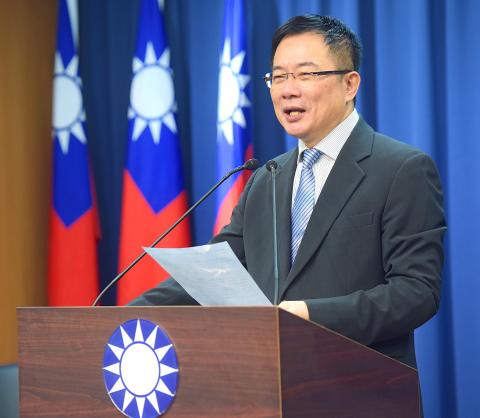The majority of Taiwanese support the Chinese Nationalist Party’s (KMT) new policy platform that aims to end cross-strait hostility through a peace accord, despite it sparking heated debates within the party, the results of KMT surveys released yesterday showed.
KMT Culture and Communications Committee deputy director Hung Meng-kai (洪孟楷) said a survey conducted by a private polling center at the KMT’s behest on Aug. 28 and Aug. 29 found that 51.5 percent of the 1,078 respondents supported the KMT’s new policy platform, while 20.2 percent did not.
“They were asked whether they think the KMT should put forward a ‘peace-centered policy platform,’ one that endeavors to further the [so-called] ‘1992 consensus’ based on the foundation of the Republic of China [ROC] Constitution and actively explore the possibility of putting an end to cross-strait hostility through a peace accord,” Hung told a news conference at the KMT headquarters in Taipei.

Photo: Huang Yao-cheng, Taipei Times
Hung said another telephone-based poll carried out from Oct. 21 to Tuesday last week that queried more than 600,000 Taiwanese also yielded a similar result.
About 51.7 percent of the respondents in this month’s survey voiced support for the KMT’s endeavors to find a “way out” for Taiwan amid damage caused to the nation’s trade and tourism industry by the Democratic Progressive Party’s (DPP) “isolationism and anti-China policy,” and to promote the party’s new policy platform of peaceful cross-strait exchanges, Hung said.
The KMT’s new policy platform, approved by the party’s national congress on Sept. 4, has been a topic of heated debate within the KMT, as it mentions the “different interpretations” component of the “1992 consensus” only once and omits what the pan-blue camp has considered an integral element in the political framework in following sentences.
Critics have said that the new platform is an attempt by KMT Chairwoman Hung Hsiu-chu (洪秀柱) to move the KMT closer to the concept of “one China, same interpretation.”
The “1992 consensus” refers to a tacit understanding between the KMT and Beijing that both sides of the Taiwan Strait acknowledge there is “one China,” with each side having its own interpretation of what “China” means. Former Mainland Affairs Council chairman Su Chi (蘇起) in 2006 said he had made up the term in 2000.
Citing another survey conducted earlier this month among 1,068 respondents, Hung Meng-kai said that 45.9 percent of those polled believed that the KMT should continue exchanges and communication with Beijing for the sake of peaceful cross-strait development and people’s livelihood, compared with 34 percent who disagreed.
“These figures suggest that the KMT’s peace-centered policy platform, which was proposed to counter the DPP’s independence guidelines, conform to mainstream public opinion and is recognized by most Taiwanese,” he said.

US President Donald Trump said "it’s up to" Chinese President Xi Jinping (習近平) what China does on Taiwan, but that he would be "very unhappy" with a change in the "status quo," the New York Times said in an interview published yesterday. Xi "considers it to be a part of China, and that’s up to him what he’s going to be doing," Trump told the newspaper on Wednesday. "But I’ve expressed to him that I would be very unhappy if he did that, and I don’t think he’ll do that," he added. "I hope he doesn’t do that." Trump made the comments in

NOT AN OPENING: Trump’s violation of international law does not affect China’s consideration in attacking Taiwan; Beijing lacks capability, not precedent, an official said Taiwanese officials see the US’ capture of the president of Venezuela as a powerful deterrent to Beijing’s aggression and a timely reminder of the US’ ability to defeat militaries equipped with Chinese-made weapons. The strikes that toppled Venezuelan President Nicolas Maduro signaled to authoritarian leaders, including Chinese President Xi Jinping (習近平), US President Donald Trump’s willingness to use military might for international affairs core to US interests, one senior official in Taipei’s security circle said. That reassured Taiwan, the person said. Taipei has also dismissed the idea that Trump’s apparent violation of international law could embolden Beijing, said the official, who was not

A cold surge advisory was today issued for 18 cities and counties across Taiwan, with temperatures of below 10°C forecast during the day and into tonight, the Central Weather Administration (CWA) said. New Taipei City, Taipei, Taoyuan and Hsinchu, Miaoli and Yilan counties are expected to experience sustained temperatures of 10°C or lower, the CWA said. Temperatures are likely to temporarily drop below 10°C in most other areas, except Taitung, Pingtung, Penghu and Lienchiang (Matsu) counties, CWA data showed. The cold weather is being caused by a strong continental cold air mass, combined with radiative cooling, a process in which heat escapes from

Snow this morning fell on Alishan for the first time in seven years, as a strong continental cold air mass sent temperatures plunging across Taiwan, the Central Weather Administration (CWA) said. The Alishan weather station, located at an elevation of about 2,200m in central Taiwan, recorded snowfall from 8:55am to 9:15am, when the temperature dropped to about 1°C, the CWA said. With increased moisture and low temperatures in the high-altitude Alishan area, the conditions were favorable for snow, CWA forecaster Tsai Yi-chi (蔡伊其) said. The last time snow fell at the Alishan weather station was on Jan. 10, 2018, while graupel fell there